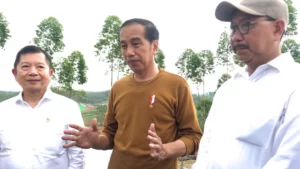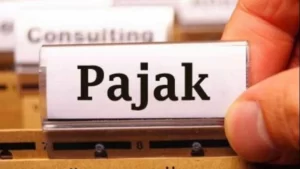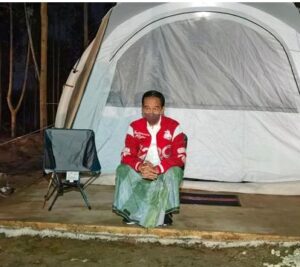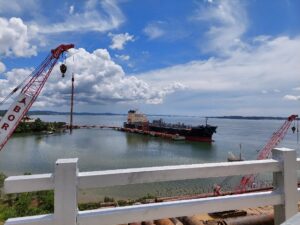
Presiden Jokowi di kawasan IKN Nusantara
STRATEGIC ASSESSMENT. Orange-red ground has been broken in the jungle of East Borneo, where the Indonesian government has begun construction of its new capital city. Officials promise a “sustainable forest city” that puts the environment at the heart of development and aims to be carbon-neutral by 2045.
The government has said it’s working to be considerate of the environment. But with construction set to ramp up this year, environmentalists warn that building a metropolis will speed up deforestation in one of the world’s largest and oldest stretches of tropical rainforest.
Experts have also expressed concerns about how the new capital will be powered. While the government vows the city will rely on a “smart energy” system, groups worry that some of the region’s coal-fired power plants could be used in the short term.

President Jokowi scrapped the mandatory income tax for domestic entrepreneurs who invest in the new capital city project in the infrastructure and public services sector worth IDR10 billion.
This tax-free program will be applied to entrepreneurs whose investment has a strategic value to accelerate the new capital city project development, which includes infrastructure and public services, economic recovery, and other business fields.
Indonesia has announced a range of new incentives for international firms to invest in its new capital, in a bid to speed up the sluggish progress of the city’s construction. Nusantara, as it is known, is currently being carved out of the red earth of East Kalimantan province on the island of Borneo, at the exact geographic heart of the Indonesian archipelago.

According to a new policy announced on March 6, the government will provide up to 100 percent corporate tax holiday for companies investing at least 10 billion rupiah ($650,745) in the new capital, as Bloomberg reported.
A top Indonesian official pledged that construction on a new capital city deep within the jungles of Borneo island would not stall when the presidency changes hands next year as new incentives were unveiled to encourage investment.
Indonesia will officially declare the city, called Nusantara, its new capital in the first half of 2024, the head of the Nusantara authority Bambang Susantono said during a visit to the site in Kalimantan in eastern Borneo.
These tax holidays will last between 10 and 30 years, depending on the sector, and will be in place the longest – until 2035 – for those firms involved in setting up Nusantara’s infrastructure and public services.
President Joko “Jokowi” Widodo has approved a new regulation that offers incentives to businesses investing in Indonesia’s planned new capital, Nusantara, including tax holidays of up to 30 years and 95 years of land use permits, the head of the Nusantara Authority said.

“The government regulation … outlines the tax holiday, the super tax deduction [and] other facilities that might be enjoyed by investors who want to invest [in] Nusantara. This is fresh from the oven,” Bambang Susantono, head of the authority, told reporters during a visit to Nusantara, in Indonesia’s East Kalimantan province on Borneo island. Widodo signed the regulation on Nusantara investment facilities, with Susantono announcing the package of incentives.
Former British prime minister Tony Blair meets with a number of Indonesian state officials during his visit. After meeting with President Jokowi in Jakarta State Palace, Blair had a session with Defense Minister Prabowo Subianto in the latter’s residence in Kertanegara, South Jakarta.
Prabowo’s spokesperson Dahnil Anzar Simanjuntak said the two have many topics in discussion but stayed silent when asked whether or not Indonesia’s new capital development project is included given that Blair is one of the members of the project’s steering committee.
The plan and development process of Indonesia’s new capital city, Nusantara, in East Kalimantan, has set off heated public debates among policymakers and public policy analysts, but Joko “Jokowi” Widodo’s administration has stubbornly proceeded with its development, a city that is envisioned to be a “forest-smart city.”
The progress of the new capital city development has reached 12-15 percent of total basic infrastructure development targeted to be fully completed in 2024. Given this progress, it is now important to think about how the ongoing development of the new capital city can successfully achieve its envisioned goals.
Creating agglomeration economies, referring to the concentration of economic activities, industries and population in a specific geographic location, is an important factor for the development of Indonesia’s new capital city.
President Jokowi is trying hard to boost investment in his flagship project, the relocation of the country’s capital from Jakarta to Nusantara, a new city being planned on the island of Borneo. He hopes to ensure the move is completed by 2045.
Jokowi has another big hope for Nusantara: to make it a leading fintech hub in Asia by attracting a nucleus of financial technology companies, including startups.
Nusantara is meant to be a green and “smart” city that makes full use of environmentally friendly digital technologies. Jokowi said: “We will build a financial center, but not like in Singapore or Hong Kong. It will be a fintech center. We will also offer very competitive investment incentives there.”

Indonesia is moving forward with its plans to build a new capital city — called Nusantara — in East Kalimantan, on the island of Borneo. The project is expected to cost approximately $34bn, and authorities hope it will be complete by 2045.
Nusantara is intended to relieve some of the environmental pressures facing the current capital Jakarta, which, apart from being polluted and congested, is the world’s fastest-sinking city. Authorities have pitched the new capital as a model for sustainable and inclusive development.
In an interview with Al-Jazeera, head of the Nusantara Capital Authority Bambang Susantono, said, “[We would like] a complete ecosystem for Nusantara to be a liveable and also, loveable city. We would like to have both — liveable and loveable goes hand-in-hand. So that Nusantara will be one of the best sustainable forest cities in the world.”
House Commission IV Deputy Chair Budisatrio Djiwandono on Friday visited Nusantara’s kilometer zero with a delegation from the U.S. Embassy in Indonesia to see firsthand the new capital’s location and construction progress. Village heads who joined the event expressed hope that the construction of Nusantara involves the practice of food sovereignty.





